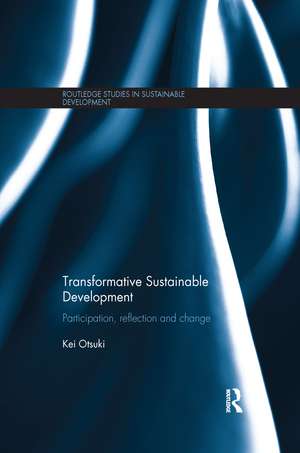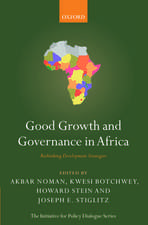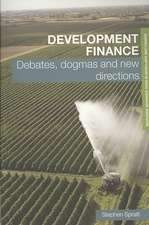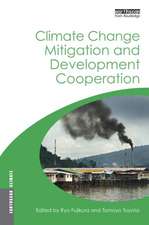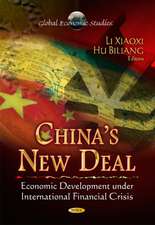Transformative Sustainable Development: Participation, Reflection and Change: Routledge Studies in Sustainable Development
Autor Kei Otsukien Limba Engleză Paperback – 4 aug 2016
This book considers how the act of participating in sustainable development projects can bring about social transformation that is considered to be fair and just by the participants and non-participants in a broader societal context. Drawing on ideas from social theory and applied anthropology, the book proposes a reflexivity-based framework to analyse participation as a type of social action underpinned by primary experience. Development projects have a transformative effect when participants are given the opportunity to reflect on their experience, share the reflection with others, and open new space for collective deliberation and change. The book applies this framework to assess community-based participatory projects in the Amazon, African slums and rural settlements, and disaster stricken areas in Japan. It also outlines potential institutions of governance to institutionalize the change by referring to current food governance, drawing out lessons with international relevance.
This book will be of interest to students of sustainable development, environmental policy and development studies, as well as practitioners and policy-makers in these fields.
| Toate formatele și edițiile | Preț | Express |
|---|---|---|
| Paperback (1) | 449.41 lei 6-8 săpt. | |
| Taylor & Francis – 4 aug 2016 | 449.41 lei 6-8 săpt. | |
| Hardback (1) | 1055.51 lei 6-8 săpt. | |
| Taylor & Francis – 17 dec 2014 | 1055.51 lei 6-8 săpt. |
Din seria Routledge Studies in Sustainable Development
-
 Preț: 311.29 lei
Preț: 311.29 lei -
 Preț: 322.34 lei
Preț: 322.34 lei -
 Preț: 304.75 lei
Preț: 304.75 lei -
 Preț: 304.67 lei
Preț: 304.67 lei -
 Preț: 416.22 lei
Preț: 416.22 lei - 14%
 Preț: 300.46 lei
Preț: 300.46 lei -
 Preț: 371.68 lei
Preț: 371.68 lei -
 Preț: 333.09 lei
Preț: 333.09 lei - 16%
 Preț: 244.38 lei
Preț: 244.38 lei -
 Preț: 446.32 lei
Preț: 446.32 lei -
 Preț: 413.55 lei
Preț: 413.55 lei -
 Preț: 490.46 lei
Preț: 490.46 lei - 16%
 Preț: 273.65 lei
Preț: 273.65 lei -
 Preț: 484.47 lei
Preț: 484.47 lei -
 Preț: 369.77 lei
Preț: 369.77 lei -
 Preț: 392.24 lei
Preț: 392.24 lei - 12%
 Preț: 299.52 lei
Preț: 299.52 lei - 18%
 Preț: 997.93 lei
Preț: 997.93 lei - 18%
 Preț: 997.90 lei
Preț: 997.90 lei -
 Preț: 411.42 lei
Preț: 411.42 lei -
 Preț: 449.41 lei
Preț: 449.41 lei -
 Preț: 487.37 lei
Preț: 487.37 lei -
 Preț: 449.41 lei
Preț: 449.41 lei -
 Preț: 382.95 lei
Preț: 382.95 lei -
 Preț: 416.22 lei
Preț: 416.22 lei -
 Preț: 416.22 lei
Preț: 416.22 lei -
 Preț: 389.49 lei
Preț: 389.49 lei -
 Preț: 325.08 lei
Preț: 325.08 lei - 17%
 Preț: 270.41 lei
Preț: 270.41 lei - 18%
 Preț: 1055.51 lei
Preț: 1055.51 lei - 18%
 Preț: 1000.27 lei
Preț: 1000.27 lei -
 Preț: 479.96 lei
Preț: 479.96 lei
Preț: 449.41 lei
Nou
Puncte Express: 674
Preț estimativ în valută:
86.01€ • 89.46$ • 71.00£
86.01€ • 89.46$ • 71.00£
Carte tipărită la comandă
Livrare economică 14-28 aprilie
Preluare comenzi: 021 569.72.76
Specificații
ISBN-13: 9781138212473
ISBN-10: 1138212474
Pagini: 144
Dimensiuni: 156 x 234 x 15 mm
Greutate: 0.45 kg
Ediția:1
Editura: Taylor & Francis
Colecția Routledge
Seria Routledge Studies in Sustainable Development
Locul publicării:Oxford, United Kingdom
ISBN-10: 1138212474
Pagini: 144
Dimensiuni: 156 x 234 x 15 mm
Greutate: 0.45 kg
Ediția:1
Editura: Taylor & Francis
Colecția Routledge
Seria Routledge Studies in Sustainable Development
Locul publicării:Oxford, United Kingdom
Public țintă
PostgraduateCuprins
Introduction 1. Towards Agentive Participation 2. Community-Based Natural Resource Management in the Brazilian Amazon 3. Community-Led Sanitation in Nairobi Slums 4. Community Resilience in a Semi-Arid Rural Settlement in Ghana 5. Community and Citizenship Building in Post-Triple Disaster Japan 6. Agentive Participation to Transform Food Governance 7. Conclusions
Recenzii
"This is a substantial contribution to the theoretical and political debates on sustainability. Based on the author’s involvement in development projects in settings as different as Brazil, Ghana, Kenya and Japan, the book convincingly shows that the construction of sustainable societies requires both fundamental transformations and pragmatic mechanisms. Key to this is human agency and participation as open ended action. I strongly recommend this reflexive and stimulating work of Kei Otsuki."
Jan Douwe van der Ploeg, Wageningen University, The Netherlands
"Many of the failures of development can be traced to the technocratic and managerial approach that has come to dominate much of the field. Here Kei Otsuki fluently demonstrates that true development is an art and that true social transformation takes place only when participation is built into the process. This book is an essential reminder of this often forgotten fact."
John Clammer, United Nations University, Japan
Jan Douwe van der Ploeg, Wageningen University, The Netherlands
"Many of the failures of development can be traced to the technocratic and managerial approach that has come to dominate much of the field. Here Kei Otsuki fluently demonstrates that true development is an art and that true social transformation takes place only when participation is built into the process. This book is an essential reminder of this often forgotten fact."
John Clammer, United Nations University, Japan
Descriere
Does participation in development projects truly facilitate social transformation gearing towards sustainable development? How do we know if the transformation is fair and just for the participants? This book explores these questions by drawing on ideas from social theory, anthropology, political ecology, and case studies from around the world.
